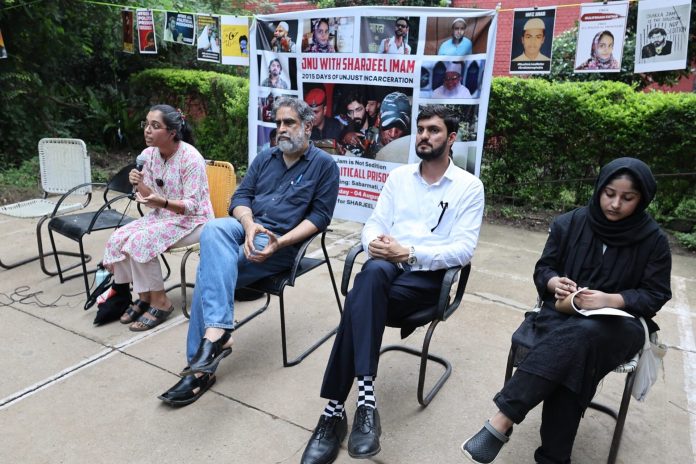New Delhi :On Sunday, students and activists gathered at Sabarmati Dhaba, Jawaharlal Nehru University (JNU), to mark 2,015 days since the arrest of Sharjeel Imam, a research scholar and prominent Muslim student activist, who has been jailed under the Unlawful Activities (Prevention) Act (UAPA) since January 2020.
Organised by independent student groups, the event was a solemn and powerful reminder of the continued detention of Imam without trial. The gathering featured speeches, panel discussions, and reflections on civil liberties, academic freedom, and the persecution of Muslim voices in India. Notably, no major left or right-wing student organizations participated in the event.
“A Functional Apartheid,” Says Hartosh Singh Bal
Veteran journalist and political editor of The Caravan, Hartosh Singh Bal, delivered a stinging critique of the Indian state’s alleged targeting of Muslim dissenters.
“The only reason Sharjeel Imam is in jail without evidence is because of his name and identity,” Bal stated. “If he had a Hindu name, he wouldn’t be in this position.”
Accusing the ruling BJP and RSS of embedding discrimination into the system, Bal also called out the Congress party for its silence on Muslim marginalisation.
“Rahul Gandhi has never used the word ‘Muslim’ in his speeches. The Congress, too, is complicit in the systemic marginalisation initiated by the RSS,” he said.
Harsh Mander: “Muslims Have Lost the Right to Have Rights”
Former IAS officer and human rights activist Harsh Mander highlighted the emotional, legal, and psychological impact of wrongful incarceration, particularly on Muslim families.
“Sharjeel Imam has not even been allowed to defend himself. Today, being Muslim in India means losing the right to have rights,” Mander remarked.
He accused the state of complicity in the 2020 Delhi violence, stating, “The Home Ministry could have stopped the pogrom within hours, but chose not to.”
Mander also pointed to the lack of accountability for hate speech by public figures, especially noting remarks by the Assam Chief Minister, which have gone unpunished.
Legal Update: “Trial May Take a Lifetime,” Says Lawyer
Advocate Ahmed Ibrahim, Sharjeel Imam’s counsel, detailed the prolonged legal delays and procedural hurdles in the case.
“It’s been five years and the trial hasn’t even begun. With over 1,100 witnesses listed, this could take decades,” Ibrahim said, blaming the misuse of the UAPA and an unyielding judiciary for Imam’s continued imprisonment.
He criticized the reliance on anonymous witness testimonies and the refusal of bail despite the absence of concrete evidence.
Targeting Muslim Scholarship and Identity
Sumaira Nawaz, a researcher, spoke about Imam’s academic contributions and the state’s alleged bias against Muslim scholars.
“His research on Muslim political representation is dismissed as communal only because of his identity. A non-Muslim presenting the same work would be celebrated,” she said.
Nawaz argued that institutions continually force Muslim scholars to prove their loyalty and nationalism. “If dissent from a Muslim scholar is not acceptable, then what’s the point of offering scholarships or education at all?” she questioned.
Former Detainee Speaks: “Sab Ayenge”
Abdul Wahid Sheikh, a survivor of wrongful UAPA detention in the 7/11 Mumbai train blast case, compared Imam’s plight to his own.
“The same pattern of fake witnesses and fabricated charges is being used,” Sheikh said. “If we can come back after 19 years, so will Sharjeel, Umar Khalid, and others. Sab ayenge (all will return).”
He emphasized that Imam’s case exposes the system’s ability to prosecute Muslims unfairly through manipulated evidence and forced narratives.
“We Failed Imam,” Says Afreen Fatima
Activist and student leader Afreen Fatima emotionally concluded the event, acknowledging the collective silence and failure to defend Imam’s rights.
“It’s shameful that we didn’t defend his speech, which was constitutional and progressive,” she said. “Before blaming the government or courts, we must reflect on how we failed him.”
Fatima urged students to read Imam’s writings and offer real solidarity, adding, “He’s resisting from inside prison. Are we supporting him enough from outside?”
—
Sharjeel Imam, a doctoral student at JNU, was arrested for a speech during the anti-CAA protests in early 2020. Authorities claim his words incited the 2020 Delhi riots — a charge yet to be proven in court. He remains imprisoned under the stringent UAPA, a law heavily criticized for its broad powers and low conviction rate.




